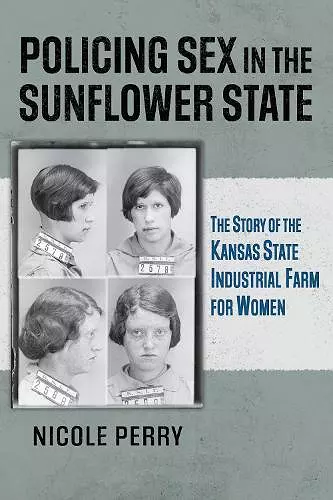Policing Sex in the Sunflower State
The Story of the Kansas State Industrial Farm for Women
Format:Paperback
Publisher:University Press of Kansas
Published:30th Jun '21
Should be back in stock very soon

Policing Sex in the Sunflower State: The Story of the Kansas State Industrial Farm for Women is the history of how, over a span of two decades, the state of Kansas detained over 5,000 women for no other crime than having a venereal disease. In 1917, the Kansas legislature passed Chapter 205, a law that gave the state Board of Health broad powers to quarantine people for disease. State authorities quickly began enforcing Chapter 205 to control the spread of venereal disease among soldiers preparing to fight in World War I. Though Chapter 205 was officially gender-neutral, it was primarily enforced against women; this gendered enforcement became even more dramatic as Chapter 205 transitioned from a wartime emergency measure to a peacetime public health strategy. Women were quarantined alongside regular female prisoners at the Kansas State Industrial Farm for Women (the Farm). Women detained under Chapter 205 constituted 71 percent of the total inmate population between 1918 and 1942. Their confinement at the Farm was indefinite, with doctors and superintendents deciding when they were physically and morally cured enough to reenter society; in practice, women detained under Chapter 205 spent an average of four months at the Farm. While at the Farm, inmates received treatment for their diseases and were subjected to a plan of moral reform that focused on the value of hard work and the inculcation of middle-class norms for proper feminine behavior.
Nicole Perry’s research reveals fresh insights into histories of women, sexuality, and programs of public health and social control. Underlying each of these are the prevailing ideas and practices of respectability, in some cases culturally encoded, in others legislated, enforced, and institutionalized. Perry recovers the voices of the different groups of women involved with the Farm: the activist women who lobbied to create the Farm, the professional women who worked there, and the incarcerated women whose bodies came under the control of the state. Policing Sex in the Sunflower State offers an incisive and timely critique of a failed public health policy that was based on perceptions of gender, race, class, and respectability rather than a reasoned response to the social problem at hand.
Policing Sex in the Sunflower State shows how patients became prisoners in Kansas as wartime venereal disease control measures shaped peacetime public health policies. Drawing on a unique source base of thousands of intake records, Perry demonstrates the diversity of experience that brought women to the Kansas State Industrial Farm for Women while finding common threads of poverty, sexual victimization, and gender discrimination. With a close look at the women who advocated for and staffed the facility, Perry explores the mixed legacy of Progressive Era women's activism and the complicated role of women professionals. Chilling stories of women who traded freedom for medical treatment and reminders of how disease amplifies all kinds of social inequalities make this an important book for today's world." - Pippa Holloway, Douglas Southall Freeman Chair in History, University of Richmond
"Nicole Perry provides a detailed, meticulously researched, and well-argued assessment of the creation of the Kansas State Industrial Farm for Women (KSIFW) and its operation during the 1920s and 1930s. Through this close examination of the KSIFW, Perry shows the powerful and sometimes life-changing consequences of the coming together of Progressive Era efforts to 'reform' working-class women, eugenics, and efforts by both the federal government and the states to contain the spread of venereal disease through a moralizing sexual double standard that held women accountable, and ultimately punishable, for its spread. Perry skillfully engages with multiple and often competing perceptions of the KSIFW while also acknowledging the real restraints historians encounter when using institutional documents to gain insight into the lived experiences of working-class inmates." - Michael Rembis, associate professor of history and director of the Center for Disability Studies, University at Buffalo (SUNY), author of Defining Deviance: Sex, Science, and Delinquent Girls, 1890-1960, and coeditor of The Oxford Handbook of Disability History
"Nicole Perry's Policing Sex in the Sunflower State offers a fascinating and timely look at the expansive power of state governments to quarantine individuals for the health of the public. Examining the impacts of venereal disease legislation passed during World War I, Perry's work details the use of such legislation to enforce a moral vision. In doing so it offers important insights into the potentially complex relationship among state power, morality, and gender." - Daniel Sledge, author of Health Divided: Public Health and Individual Medicine in the Making of the Modern American State
ISBN: 9780700631889
Dimensions: 228mm x 152mm x 17mm
Weight: 433g
296 pages